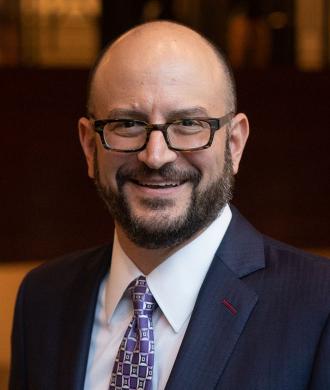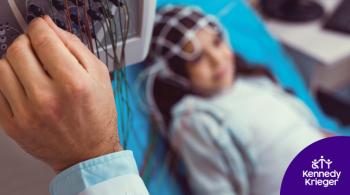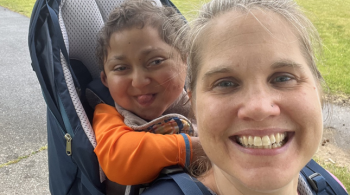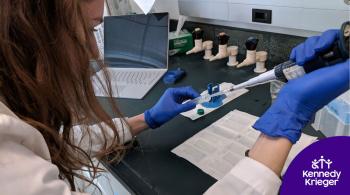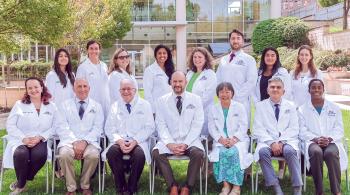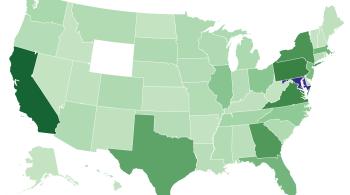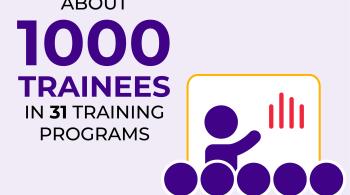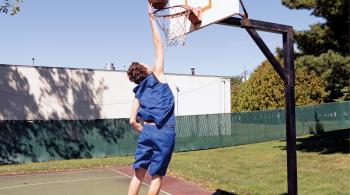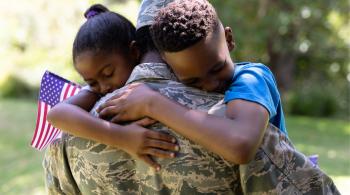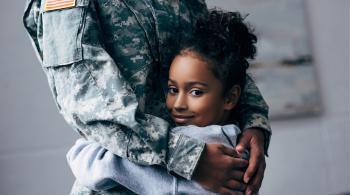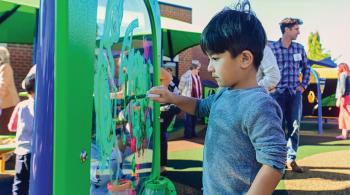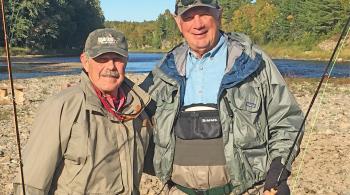Long COVID in Children
On this month's episode of Your Child's Brain, Long COVID in children is discussed.
Guests include:
- Dr. Laura Malone - Physician scientist in the Center for Movement Studies at Kennedy Krieger, Co-director of the Pediatric Post-COVID-19 Rehabilitation Clinic at Kennedy Krieger, Assistant professor of Neurology and Physical Medicine and Rehabilitation at the Johns Hopkins University School of Medicine.
- Dr. Amanda Morrow - Rehabilitation physician at Kennedy Krieger, Co-director of the Pediatric Post-COVID-19 Rehabilitation Clinic at Kennedy Krieger, Assistant professor of Neurology and Physical Medicine and Rehabilitation at the Johns Hopkins University School of Medicine.
Learn more about our Pediatric Post-COVID-19 Rehabilitation Clinic
Learn More About Our Featured Speakers
Learn More About Our Featured Speakers
View Episode Transcription
Welcome to Your Child's Brain, the podcast series produced by Kennedy Krieger Institute with assistance from WYPR. I'm Dr. Bradley Schlaggar, pediatric neurologist and President and CEO of Kennedy Krieger Institute. As we are well into year 3 of the COVID-19 pandemic, we're learning more and more each day about COVID-19 and about SARS-CoV-2, the virus that causes it. But there are still so many things that we don't know, especially about COVID in kids. Today we will be discussing the phenomenon of long COVID. That's the persistence of COVID-related symptoms well after the infection is over, and in particular, we'll be discussing long COVID in children. As parents and students gear up in the next few weeks for another school year with this pandemic, we thought it would be timely to share with you our current understanding of long COVID in children. Today I'm joined by my colleagues, Dr. Laura Malone and Dr. Amanda Morrow, who are the Co-directors of the Pediatric Post-COVID-19 Rehabilitation Clinic at Kennedy Krieger. Dr. Malone is also an Assistant Professor of Neurology and Physical Medicine and Rehabilitation at the Johns Hopkins University School of Medicine. Dr. Morrow is an Assistant Professor of Physical Medicine and Rehabilitation at Johns Hopkins University School of Medicine as well. Welcome, Laura and Amanda. Let's start with some definitions. What does the term long COVID mean? What are the symptoms in kids, and how do you diagnose it?
Sure. We've heard a bunch of different terms thrown out there in the media. Long COVID, long-haul COVID. There's also a term post-COVID condition. But these all refer to a condition where children and adults develop new, ongoing, or recurrent symptoms after their initial COVID-19 infection. Then the WHO, the World Health Organization, recently published a definition of post-COVID conditions, expanding that to a symptom onset, usually occurring within about three months of initial infection with symptoms lasting for at least two months. These symptoms can't be explained by any alternative diagnosis. Some of the common symptoms that we're seeing, you had asked. Fatigue is one of the major symptoms that we're seeing in children. Lightheadedness, especially with positional changes. Brain fog or cognitive difficulties, headaches, chest pain, difficulty breathing, muscle or joint aches, and pains. Sometimes stomach pains, skin rashes. It's really a variety of symptoms affecting multiple different organ systems.
Laura, I think it'd be helpful if you took us through a story about one of the patients that you see in the post-COVID clinic.
Sure. We've seen a wide range of symptoms and presentations in our patients. But just one example is actually pretty early on. After our clinic was started, we saw a young woman. She was a teenager that was an avid soccer player, just very active, engaged in both school and community activities. She had a mild case of COVID acutely. She had a little bit of runny nose. Really didn't think a whole lot about it, but tested positive for it and started to feel better after a few days. Then she developed some really persistent fatigue to the point that she wasn't able to play soccer anymore. She had trouble just doing regular activities with her family. Just normal types of I'm walking around the neighborhood or those types of things due to this persistent fatigue and feeling lightheaded when she was trying to walk around and things. This really lasted for quite a while before she came and saw us. On the order of five or six months, she continued to experience these symptoms, and things gradually improved over time. We got her into some physical therapy. We had her work with a counselor to talk about how all of her body and how she was struggling in these activities was affecting her mood and all those things. We really saw that she had great improvement over time, and she was able to go back to her regular activities. Going to play soccer on her team and really just returned to her usual life.
That's a great outcome. I'm wondering if that time course is typical of what you've been seeing, or is there a variety of time courses that patients present with?
That's a great question. It is common to see that type of time course, but there are different patterns that patients can have. Some patients will say that I felt really fatigued or sick acutely, and then my symptoms have just lingered on from that time period. Others say that they have this improvement, and then they either develop new or those symptoms reoccur. We've even seen in some patients where they'll have long periods of recovery back to their usual activities, and then something triggers again the symptoms to reoccur to affect their lives to a great deal again. There are different patterns. I think it's really important to be aware that new symptoms can occur, and there can be these times of feeling pretty good, and that doesn't exclude a long COVID diagnosis.
Got it. Amanda, when you go back to the beginning of the pandemic, almost 2.5 years ago, there were greater likelihood of adults getting COVID, and then we started hearing about long COVID in adults. Then shortly after that, we started to get the first signal that children were having not just COVID infections but getting long COVID as well. What is the risk for children getting long COVID, and are certain children or teens more likely to develop it?
It's still a bit unclear what the risk will end up being. A recent meta-analysis suggested that it may be about a quarter of pediatric patients develop long COVID after their initial COVID infection. Some more conservative studies, their estimates are about 10 percent. But really, there's a wide range that's reported in the literature from about 2-60 percent in individual studies. The data is still to be determined there. As far as the age groups, it does seem to be impacting later school-aged children in adolescence. But we are seeing younger ages impacted as well.
Laura, we knew of other chronic illnesses that affect the nervous system that we think are caused by or driven by acute viral infections. For example, multiple sclerosis appears to be related pretty strongly to Epstein-Barr virus, the virus that causes infectious mononucleosis or mono. Is there a similar mechanism for SARS-CoV-2, COVID, and long COVID? What do you know about the proposed mechanisms for long COVID?
There are multiple proposed mechanisms out there that are currently being researched, which I think is a really important thing to understand because then it helps us understand how best to treat and design and develop medications that can target it.
There are various theories out there that are being tested like I mentioned and some of those are, it really is thought to be a combination between the virus effects and also maybe some hosts effects in the person themselves. Some of this is the virus somehow causing a dysregulated immune response, whether that's to the acute virus or maybe some persistent inflammatory effects. Then there's also the ideas that SARS-CoV-2 might cause an auto-immune response in some people that were the body is then going and attacking itself. There's ideas that maybe there's this lingering virus that exists in reservoirs in the body that might be driving it as well. At this point, we really don't know the exact answer to that, but I think that there is mounting evidence at least that I've seen from a neurological perspective to this idea of an immune dysregulation or inflammatory response. Because there have been some studies that show changes in the brain that would lead us to believe that this might be a significant mechanism. But I think that in the end, there probably is going to be a multi-factorial type of reasoning as to why people develop long COVID. I think that some of those mechanisms might be slightly different in children and adults because their acute infections tend to be different, which I think is really important to take into account as well as we're studying these mechanisms.
We're talking about an infectious process that maybe triggering an immune response as we've just laid out. So Amanda does a, does a vaccine prevent long COVID by potentially preventing that initial infection or the body's response, a strong response to that infection? What do we know about vaccines and potential prevention of long COVID?
There have been some recent studies that are suggesting that vaccines may treat or decrease the burden of long COVID and those who are affected. One study out of the UK in adults found a decrease in long COVID symptoms by about 20 percent after two vaccine doses. Another study published in Jama recently showed a lower long COVID prevalence in those who had had two or three doses of the vaccine compared to those with no vaccination. We are hopeful that vaccination may help prevent long COVID and in general, vaccine reduces your risk of developing COVID in the first place. The best way to prevent long COVID is to prevent yourself from ever getting COVID infection if possible.
We're starting to hear Amanda that you can get multiple infections especially lately with the recent variants of omicron. Is there any evidence that there's a compounding risk of having long COVID after multiple COVID infections?
Unfortunately, yes, we know people can get COVID infection more than once. At least anecdotally in our clinic we have seen in some children, even if they did not develop long COVID after their initial COVID infection, they will develop long COVID after maybe a second COVID infection or a third. Again, just going back to that vaccination point, the more we can prevent long COVID or infection with COVID, hopefully we can prevent long COVID from developing.
Then I want to be clear there's not evidence that when somebody has long COVID that that condition is contagious, correct?
Absolutely not long COVID is not contagious.
Laura, as I mentioned at the outset, the two of you co-direct the pediatric post COVID-19 rehabilitation clinic in the Krieger. Can you tell us how that clinic is configured and what the thought process is for the approach that you take to caring for patients with long COVID?
Sure, so our clinic was started in the fall of summer time of 2020. Our clinic has changed over time depending on the needs of the patients as we've learned more about how we can help support children that are suffering from these symptoms. Our approach is to use a multi-disciplinary approach in order to tackle on COVID from multiple different perspectives and viewpoints. We have different clinicians with various backgrounds in our clinic. I addressed the neurological symptoms and needs of patients. Dr. Morrow addresses the rehab. We also have behavioral psychology in our clinic, social work, physical therapy, and everybody takes a little piece to the puzzle, which I think is really important because many of the symptoms overlap multiple domains. We really focus on the functioning of children and getting them to improve their quality of life, to be able to participate in their activities, and to do that through different therapies, but also using medications when that's appropriate to help them, help with their pain, or help with their fatigue, those types of things.
Amanda, as you've been since the outset, really first few months of the pandemic because when we stood up this clinic, you've seen long COVID playing out over the course of the pandemic. How has the nature of long COVID changed with the different variants of the virus over time?
I've mentioned we have seen long COVID develop related to each of the variants and the different waves, but some of the different variants had more prominent symptoms. As an example, the original strain there were more reports of prolonged loss of taste and smell as an initial issue, but also related to long COVID. We're hearing this less with the more recent strains and then just in general, the Alpha and Delta strains were associated with more severe acute illness, especially in adults. There are symptoms of long COVID may also encompass the fact that they were hospitalized and had cardiac and pulmonary co-morbid issues related to the initial infection.
Versus omicron seems to be causing less severe illness. Then there was a recent study published in The Lancet that reported that the risk of developing long COVID after omicron was only about half the risk of developing long COVID after delta. But in general, because omicron was so infectious and impacted so many people were actually seeing a higher number of long COVID cases related to omicron, just related to the number of infections.
That's a really important point to emphasize. So I think the headline for that study was omicron has the lower risk at an individual level of developing long COVID, which is good. But the overall rate of long COVID is higher because of the greater overall infectivity of that variant. Really important.
Managers brought up the issue of how severe illness also has features that can look like this phenomenon of long COVID. So how do you separate out what's related to the consequences of more severe initial illness versus long COVID or is it possible to really pull those apart?
Yeah, I think that that's where understanding the mechanisms really is important. So we know that being in a intensive care setting, having a severe illness and being hospitalized can be associated with long-term problems, whether that's with fatigue or people have memory problems or cognitive problems sometimes after that. That's well-known, especially in the adult population where it's been more studied. I think that that's a major consideration in the adult patients with long COVID is that we're grouping both people that have this severe illness and then also those that have even adults that mild acute illness that then develop these post acute symptoms. The pattern that we see more commonly in children is the mild acute infection and then these post-acute sequella. I think that it's important to understand the mechanisms and also to really try and study children with long COVID as well and not just rely on adult studies. Because there may be some of these differences. I think that's really important to ascertain and understanding mechanisms helps us understand that overall.
I can imagine that parents listening in, who may be wondering if their child needs attention for potential long COVID. So Amanda, when should a parent seek help for long COVID?
So I think a parent should seek help whenever they are concerned. But in general, I would say about four weeks after the initial infection if their child is still experiencing symptoms related to that or new symptoms, it's a great idea to bring that up with their pediatrician so they can do an evaluation and make sure there's nothing else going on, or complications that have developed. Then if they do think the symptoms may be related to the development of long COVID, the hope is that the early we can intervene and make some recommendations and recognize this syndrome, hopefully we can get kids on the right track to be able to feel better, to be able to still participate in their school and their activities so that they continue to have a good quality of life as their bodies are recovering from the illness and getting better over time.
One of the barriers may be and I suspect that you're still hearing this, that there's a dismissiveness about the symptom complex that is long COVID. Could you speak to that? Also what other kinds of misconceptions do you here on the front lines? Laura, maybe take this one about long COVID.
I think with regards to misconceptions, we still do hear people sometimes say, I didn't realize children could even get COVID or if they got COVID, it's no big deal, which fortunately for a lot of children, that is the case, but for some it's not. I think even more so people aren't aware that children can have long COVID. They think you have to have some severe hospitalization acutely in order to develop long COVID, and that's just not the case. So I think that it's really important to be aware of it. As you mentioned, Brad, to not be dismissive of the symptoms that children might be experiencing because a lot of these symptoms are sometimes a little vague, a little nebulous, hard to pin down. They can also be something that occurs gradually over time. So it can be hard to say this exactly is a change in my child, but it's important to believe the children, to talk to them about it and to take that seriously and to talk about it with health care providers because there are things that we can do in order to help them feel better and help the recovery process.
One of the concerns clearly, as I mentioned at the outset, we're heading into the next school year and the issue of how these symptoms interact with success in school. So Amanda, how do you advise parents and schools to support kids who are experiencing long COVID?
Well, there definitely needs to be a conversation between the family and the school. Schools need to be educated about long COVID, what it is, how it manifests, how they can support their students. As Laura already mentioned, just making sure they're not dismissing their symptoms and they're providing supports. As we've mentioned, long COVID can affect school performance, especially in those who have brain fog and cognitive complaints and fatigue. Some of these kids are feeling very debilitated. Kids may qualify for special education and related services under the Individuals with Disabilities Education Act or the idea Act or Section 504. Accommodations can often be helpful school-based accommodations. So examples include rest breaks, decreased assignments, having increased time to take tests, having a quiet place to work. It's really important to look at each child individually and figure out how they can make it through a school day so that they're still to participate and conserve their energy to be able to participate in their activities as well.
To that point, Amanda, some children may already have individualized education programs or 504 plans. What do you recommend for those students as the school year is beginning, who are experiencing long COVID?
I would say to make sure that they're reviewing their plans, to make sure that there are accommodations are appropriate and talking with their medical providers just to make sure that all their symptoms are being considered when they're reevaluating those plans.
Laura, let's let's talk a bit about the both of you are very much involved in long COVID research with other clinicians around the country. Can you tell us what's happening for pediatric long COVID research?
Sure. There's a lot of effort for different centers to collaborate and work together. Amanda and I and actually some other members of our team are involved in projects like developing pediatric specific guidance for primary care doctors, for places that want to develop their own pediatric long COVID clinics, which I think is important because it's important to be able to disseminate the knowledge and the experience that people have with any new diagnosis. We're involved in those types of activities and were involved in national and international collaborations trying to describe the syndrome a little bit more. In order to understand also what treatments help patients and if there's any particular risk factors that might predispose patients to developing long COVID. I think that this again highlights the importance of setting pediatrics in particular and not just relying on adult based research. There's national and international efforts that's really trying to do that.
Amanda, maybe close with some final comments about issues that you think needs to be highlighted. Really just to emphasize some takeaway messages for our listeners.
Just to summarize some of the points we've made and for people to take away from this. Long COVID is a real condition. We are seeing this in children and adults. We're seeing how affected that people can be and how much their quality of life can be impacted. Some of these children are very debilitated. So we need to be vigilant with supporting these kids, recognizing the illness and providing early treatment strategies to help them feel better. Then as we've already mentioned, making sure we're supporting them through school and with other resources so that they can get back to themselves and feeling normal again.
You've been listening to your child's brain. Thank you to our guests and we hope that you are listeners have found this information helpful. Your child's brain is produced by Kennedy Krieger Institute with assistance from WYPR and producer Spencer Brian. Please join us next time as we examine the mysteries of your child's brain. [MUSIC]

